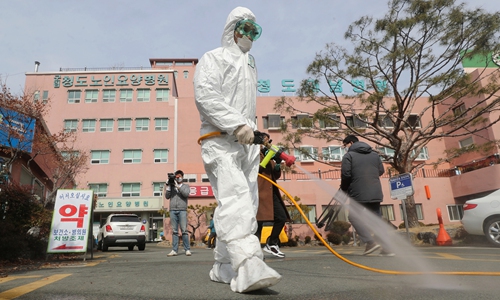HOME >> WORLD
Coronavirus batters S.Korea
By Wang Wenwen Source:Global Times Published: 2020/2/21 21:39:44
Number of infections balloons, weighing on economy

A South Korean health official sprays disinfectant in front of a hospital where a total of 16 infections of COVID-19 have been reported, in Cheongdo county near the city of Daegu on Friday. Photo: AFP
The number of confirmed coronavirus cases in South Korea surged to 204 on Friday. The severe situation in South Korea also tests how resilient its economy is as well as its relations with China.
The number of those infected increased four times over three days as South Korea reported 100 new confirmed cases on Friday following 53 on Thursday. Among the 100 new cases, 87 are in Daegu, a city two hours south of the capital Seoul. A 61-year-old woman is believed to be the "superspreader" who infected other churchgoers at the Shincheonji Church of Jesus, an institution accused of being a cult, who were put in quarantine.
Earlier, two cases were confirmed in South Korea's 600,000-member military. The navy sailor and the army officer had both visited Daegu recently.
The infection cases have led to concerns about the South Korean economy which expanded at a fast pace.
South Korea's tourism has already been severely affected by the coronavirus epidemic in China. China has been South Korea's largest tourist source, taking up as much as 50 percent of visitors. South Korea reported a record number of Chinese tourists last year due to improved relations between the two countries.
In the wake of the coronavirus outbreak, South Korean airlines have reduced their routes to China by 40 percent, and the demand for South Korea's hotel, tourism and transportation sectors has been shrinking.
As a close neighbor of South Korea, China buys about a quarter of its exports, while the biggest exporters in South Korea such as Hyundai have been badly hit by the delayed shipments of parts from China.
Earlier this month, South Korean President Moon Jae-in warned that "emergency steps" were needed to save the country's economy amid China's coronavirus outbreak.
Ratings agency Moody's on Monday cut its forecast for South Korea's 2020 economic growth to 1.9 percent from 2.1 percent, citing the economic fallout of the new coronavirus.
Li Jiacheng, a research fellow at the Research Center for the Economies and Politics of Transitional Countries of Liaoning University, told the Global Times that the surge of infected cases in South Korea will make the prospect of the South Korean economy even dimmer.
"Besides tourism and exports that highly depend on China, South Korea's distribution industry will be badly hurt. As people gradually understand the harm of the virus, they will reduce going to shopping malls and restaurants. Foreign investors' confidence in South Korea will also be affected," said Li.
Li noted that given the different governance styles and systems in the two countries, South Korea can hardly adopt the same lockdown measures as China to contain the spread of the virus, but China also offered assistance on the government and public levels to South Korea in a reciprocal manner as South Korea offered great help to China.
"Groups in China engaged in people-to-people exchanges can donate medical materials to South Koreans," Li said.
China has donated a batch of nucleic acid kits for the coronavirus to Japan.
Zhao Lixin, a professor and director of the School of International Politics, Institute of Politics and Public Management at Yanbian University, believes that China can share its medical experience and community preventive work experience in the past month with South Korea.
Kay Park, a Seoul-based writer, told the Global Times on Friday that people from China and South Korea and beyond must learn lessons from the epidemic.
"Compared to SARS, this outbreak proves that the world is more connected than ever and people are more mobile. So each person should remember that while they're contributing to the positive side of globalization, they could be responsible for something infectious," Park said.
Posted in: ASIA-PACIFIC